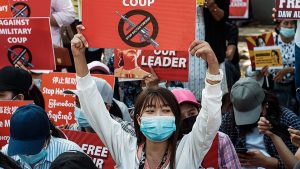On Saturday, a 10-year-old boy was enjoying his weekend playing games with his friend, 13, near downtown Yangon, Myanmar.
When armed forces pulled up in a military truck and began to fire into the air, the boy grabbed his friend’s hand and ran – but his friend was shot in the back of the head and fell to the ground, eyewitnesses told Vice News.
The boy ran and hid from the soldiers. Later, at his friend’s funeral, somebody had to lift him up as he was not even tall enough to see inside the casket.
It is unthinkable that any child should see their friend shot in the head. Yet this 13-year-old boy is just one of 43 children killed in the two months since Myanmar’s military coup began on February 1, according to the Assistance Association for Political Prisoners (AAPP).
It is chillingly clear: Myanmar is no longer a safe place for children.
The past couple of weeks have shown that children are not even safe in their own homes. My Save the Children colleagues in Myanmar tell me of at least three cases of young children – 7, 11, and 12 years old – shot and killed by armed forces in their homes over the past 10 days. Last week, a 7-year-old girl was shot dead as she ran into her father’s arms, her story making headlines around the world.
I am horrified that children continue to be among the targets of these fatal attacks. All children have a right to grow up free from violence. The fact that so many are being killed on an almost daily basis now shows a complete disregard for human life – and international law – by armed forces.
For all the unspeakable stories like these, there are young friends and siblings who have had to witness horrors that no child should have to face.
Save the Children and its partners are providing support to children who have been harmed and their families where possible. Our staff are providing front line emotional support to children who have witnessed violence, and referring children with severe mental health needs to specialists.
Our team helped one 12-year-old girl who saw her two younger sisters, aged 2 and 4, die in an arson attack on their village in Hpa an, Karen State. The impact on her mental health has been severe. Other children are suffering with the loss of family members, while some are still too young to understand the horror: One child who lost her father believed that he was “only sleeping.”
We are also distressed by the less visible suffering some children are experiencing. Of the 2,608 people who are still detained, 20 are children.
Prison is no place for a child and being held in detention is likely to be extremely traumatic, particularly for younger children who are already struggling with the fear, loss, and injuries that these violent crackdowns are causing.
In every crisis around the world, children are the innocent victims. Their safety must be prioritized and protected under all circumstances, and the only way to protect children in Myanmar is to stop the violence against people altogether.
Save the Children therefore renews its call on armed forces to bring an immediate end to these deadly attacks against protestors, before more children are injured or killed.
But our collective words are not enough. We need action. Save the Children will continue to do everything we can on the ground to support the children of Myanmar, but ASEAN leaders must come together urgently to protect the lives and liberty of people in Myanmar and ensure no more lives are lost to this deplorable violence.
Some ASEAN states have come out strongly against the violations in Myanmar, but the bloc is still split on how to move forward. This has to end – politics should never prevent action to save children’s lives.
In addition, it is essential that refugees fleeing the violence and repression are given safety and protection. For this to happen, ASEAN members must avoid pushing back refugees to Myanmar, and allow aid groups unfettered access to new arrivals in their countries.
Inaction is not an option. We must do everything we can to protect children in Myanmar from further harm.
For the 43 young victims of this crisis, it is sadly already too late.

































